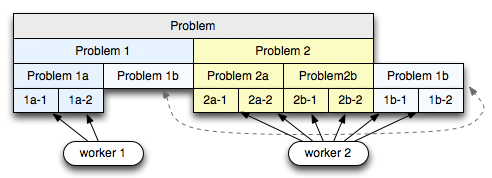The fork/join framework is an implementation of the ExecutorService interface that helps you take advantage of multiple processors. It is designed for work that can be broken into smaller pieces recursively. The goal is to use all the available processing power to enhance the performance of your application.
As with any ExecutorService implementation, the fork/join framework distributes tasks to worker threads in a thread pool. The fork/join framework is distinct because it uses a work-stealing algorithm. Worker threads that run out of things to do can steal tasks from other threads that are still busy.
Reference: https://docs.oracle.com/javase/tutorial/essential/concurrency/forkjoin.html
Reference: https://www.igvita.com/2012/02/29/work-stealing-and-recursive-partitioning-with-fork-join/
One of the key challenges in parallelizing any type of workload is the partitioning step: ideally we want to partition the work such that every piece will take the exact same amount of time. In reality, we often have to guess at what the partition should be, which means that some parts of the problem will take longer, either because of the inefficient partitioning scheme, or due to some other, unanticipated reasons (e.g. external service, slow disk access, etc).
This is where work-stealing comes in. If some of the CPU cores finish their jobs early, then we want them to help to finish the problem. However, now we have to be careful: trying to "steal" work from another worker will require synchronization, which will slowdown the processing. Hence, we want work-stealing, but with minimal synchronization.
Given a problem, we divide the problem into N large pieces, and hand each piece to one of the workers (2 in the diagram above). Each worker then recursively subdivides the first problem at the head of the deque and appends the split tasks to the head of the same deque. After a few iterations we will end up with some number of smaller tasks at the front of the deque, and a few larger and yet to be partitioned tasks on end.
Imagine the second worker has finished all of its work, while the first worker is busy. To minimize synchronization the second worker grabs a job from the end of the deque (hence the reason for efficient head and tail access). By doing so, it will get the largest available block of work, allowing it to minimize the number of times it has to interact with the other worker (aka, minimize synchronization).
Fork: Split larger task into smaller tasks.
Join: Get result from same level subtasks.
if (my portion of the work is small enough)
do the work directly
else
split my work into two pieces
invoke the two pieces and wait for the results
We find the minimum in the table using fork-join.
-
define THRESHOLD if satisfied, we compute minimum in a straight way:
private static final int THRESHOLD = 20; if (left - right <= THRESHOLD) { return calculateMin(arr); } else { // fork / join } private Integer calculateMin(int[] arr) { return Arrays.stream(arr).min().orElseThrow(() -> new RuntimeException("Minimum doesnt exist in the array: " + Arrays.toString(arr))); } -
divide task
if (left - right <= THRESHOLD) { // } else { int middle = (left + right) / 2; FindMinimum findMinimum = new FindMinimum(arr, left, middle); findMinimum.fork(); return Math.min(new FindMinimum(arr, middle, right).compute(), findMinimum.join()); }
- we randomly generate array with range
[-1_000_000; 1_000_000]Random r = new Random(); for (int i = 0; i < arr.length; i++) { arr[i] = r.nextInt(2_000_000) - 1_000_000; } - set the minimum
-1_000_005somewhere in the tablearr[50_000] = min; - run tests:
- computeUsingForkJoin - on my CPU - around 15 ms
- computeOrdinary - on my CPU - around 115 ms
